Socializing your Dachshund is essential for their overall quality of life.
These feisty dogs are natural born hunters who are known for displaying some aggressive tendencies, but socializing them properly will help keep those related behaviors at bay.
A socialized Dachshund is less likely to display fear, aggression and anxiety.
Before jumping feet (and paws) first into socializing your Dachshund, ensure they have their first vaccines.
In this article we’ll discuss how to work on socialization without vaccines, but we always recommend proper vaccinations before fully exposing your pup to other dogs and places.
What is Socialization?
Socializing your Dachshund means that you are helping them become accustomed to a variety of smells, sounds, and sights.
When you socialize your Dachshund, you are building their confidence while preventing them from becoming scared of new people, dogs, and circumstances.
Socializing your Dachshund can improve their behavior.
Unfortunately it’s easy for a dog to become fearful when not socialized properly, especially for the Dachshund who is prone to anxiety.
Ideally a Dachshund should be socialized before 16 weeks old if possible.
However, if you adopt an adult Dachshund, it’s still possible to effectively socialize them with repetition and positive reinforcement training.
Why is it Important to Socialize Your Dachshund?
It’s important to socialize your Dachshund to decrease the chances that your pup will become fearful, aggressive, and anxious.
A well-socialized dog is generally confident and comfortable in unfamiliar situations. They will be more likely to go-with-the-flow.
If you’re someone who likes to travel with your Dachshund, takes them on outings or meet up with friends, it’s especially crucial that you properly socialize them.
One of the biggest Dachshund training secrets is to work on proper socialization early.
We understand that you may not have acquired your Doxie as a puppy, but the sooner you can work on socializing them, the better.
How to Socialize Your Dachshund Puppy
Socializing your Dachshund before 16 weeks old is imperative. This is when they are the most impressionable and when your pup will ultimately become fearful or brave.
You should aim to socialize your dog while they’re young, preferably before 16 weeks old.
Most owners want their Dachshunds to be happy around people and other dogs, and that’s where socialization comes into play.
Socializing your Dachshund puppy can help them:
- Get used to new sights, sounds and smells
- Learn to walk and go potty on different surfaces such as grass, rocks and concrete
- Properly greet and play with other canine friends
- Be friendly toward humans and children
- Become comfortable in new places such as hotels, stores, the car, friend’s houses, etc.
Some fun ways you can socialize your Dachshund puppy using positive reinforcement training are:
- Take them on car rides
- Take them on the bus (if your public transportation system allows it)
- Introduce new doggy friends in small groups
- Go on walks in new places
- Walk where there are loud and unfamiliar noises (like on garbage truck day in your neighborhood)
- Enjoy short training sessions in unfamiliar places
If you plan to take your Dachshund puppy into the world, it’s usually recommended that they have at least their first set of vaccinations. Dogs who aren’t vaccinated can easily contract illnesses such as Parvo, which can be fatal.
Some veterinarians, depending on the risk found in your area, may suggest that you wait until your puppy has had all of their vaccinations.
It’s necessary that they have all of their necessary vaccinations.
Unfortunately, if you wait that long to start with socialization exercises, you will likely have missed the “socialization window”. Luckily, there are things you can do in your own back yard or in your home.
How to Socialize Your Puppy without Leaving Your House
If you are eager to start socializing your Dachshund puppy but feel like the risk of letting them outside on the ground where germs lurk, there are things you can do to socialize them within your home.
Slowly start introducing them new noises and sights.
Some of these are:
- Lay different things on your carpet for your puppy to walk on like a metal baking sheet, a rug if you have wood floors, a piece of wood if your floors are all carpet, a metal grate (the bottom oven rack can work).
- Lay “strange” objects on the floor for them to explore like a rope.
- Wear a hat, or a sweatshirt hood, and show them that you are safe and not scary (handing out treats with a hat on really helps).
- Invite your friends to bring their dog over as long as they have no illnesses and haven’t visited a public place with a lot of dogs (like a dog park or dog daycare) in the last few weeks
- Use things in the house to mimic loud noises that can be found outside. You obviously don’t want to scare your puppy, but tapping a glass with a spoon, or gently banging a couple of pots together, will help them be more accepting of unfamiliar sounds.
- Go ahead and slam the cupboard door. It sounds strange but closing a cupboard door hard will help get a dog used to “door sounds” so they are less likely to bark when one closes. Gently knocking on the counter once in a while can help in a similar way.
- Spend some time just hanging out in the back yard with your puppy. They are likely to hear strange noises from the street and experience different smells.
Also, consider taking your puppy out of the house anyway but carried in a sling so that they can experience the world without touching the ground.
If people want to pet your Dachshund puppy (which they will), politely ask them to use some hand sanitizer or wash their hands before touching your pup.
Is it Too Late to Socialize My Adult Dachshund?
The short answer to this question is absolutely not. It’s never too late to socialize an adult dog, but it may take more time and patience.
Also, you may need to adjust your expectations. An older dog that missed proper socialization at a young age may have developed anxiety and fearfulness.
If this is the case, socialization exercises can help them feel more secure and happy but they may never reach the degree of calmness that a puppy socialized early on can have.
Consistency and repetition are key for training any dog, but Dachshunds sometimes take a little more time to come around.
Positive reinforcement training is the most effective way to train any dog, so make sure you have a pocket full of treats ready to go!
Puppies and adults can be socialized the same way.
You can socialize your adult Dachshund the same way you would socialize a puppy.
But if your newly adopted adult has anxiety or fear issues already, you may need to make the process more slowly.
Identify what causes their fear or anxiety, and take that into account when bringing your canine companion on outings and adventures.
If your older Dachshund happens to suffer from severe anxiety, you may consider talking to your vet about options. There are medications that can be incredibly helpful for nervous dogs who are desperate for some relief.
Sometimes a small dose of helpful medication can take the edge off enough so you can successfully train and socialize your Dachshund as needed.
Helpful Dachshund Training Secrets
These beneficial tips will help you effectively socialize and train your Dachshund:
- Never force your dog to do something if they are displaying fearful behavior. Putting them in a threatening situation when they are already scared will only cause more fear, skittishness and anxiety.
- Always use reward-based training, rather than aversive training tools such as shock or prong collars.
- Be gentle and loving with your Dachshund, and don’t allow anyone to be rough with them – children included.
- Keep training sessions and outings short, especially if you have just started training them.
- Keep your Dachshund safe, but allow them to experience things such as playing with doggy friends without becoming involved. We understand you may be overprotective, but your dog needs to also learn how to play without human interference.
Dachshunds aren’t known for being the easiest to train, but it’s not as hard as people thing (and it’s worth it in the end).
Remember that Dachshunds are not the easiest breed to train or socialize but it can definitely be done.
The number one thing to remember when training and socializing your Dachshund is that this breed may require extra time and patience to get them as confident as they deserve to be.
Final Thoughts
Socializing your Dachshund should be about teaching them to be happy and content in any situation.
A trained dog is a happy one, and working together will help strengthen your bond.
Cherish the time that you spend socializing your Dachshund, as it’s time you get to grow your love and experience life together.
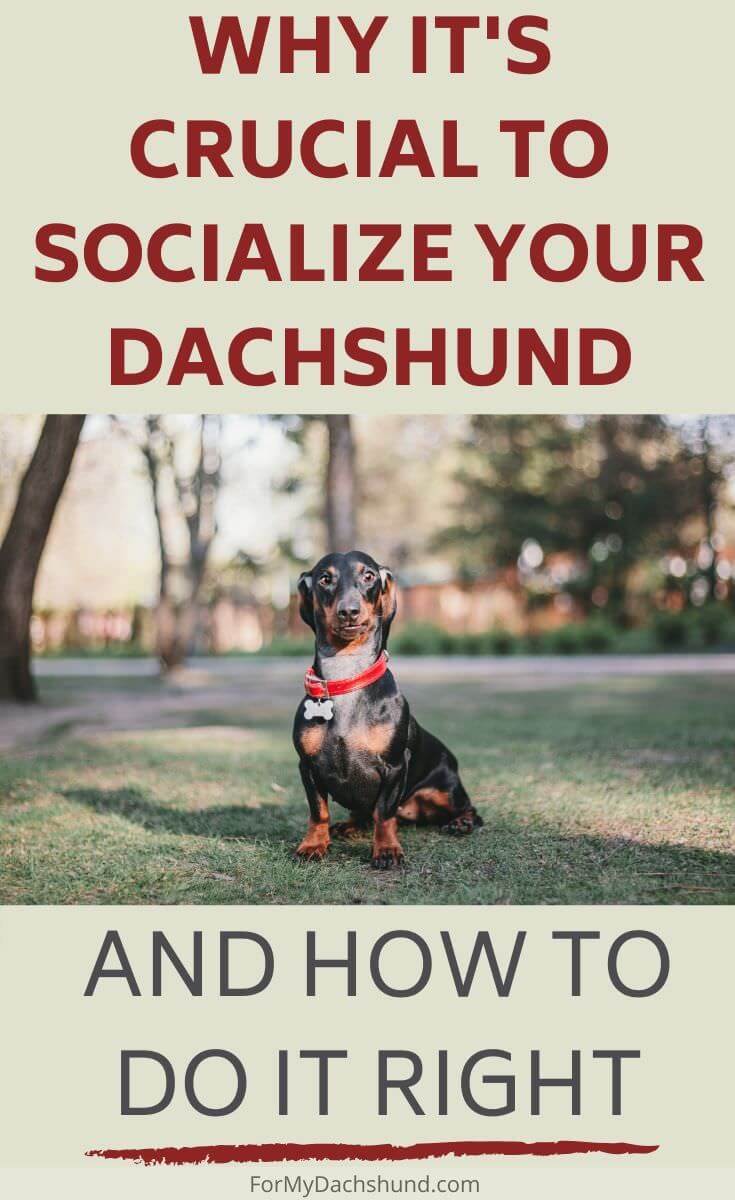
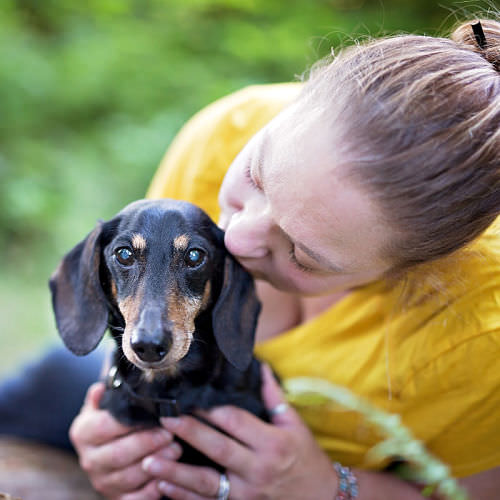
About the Author: Through her 17 years of owning and caring for Dachshunds, and almost 10 years researching and writing about them, JW has become a respected expert in the Dachshund community. Read more about her here.

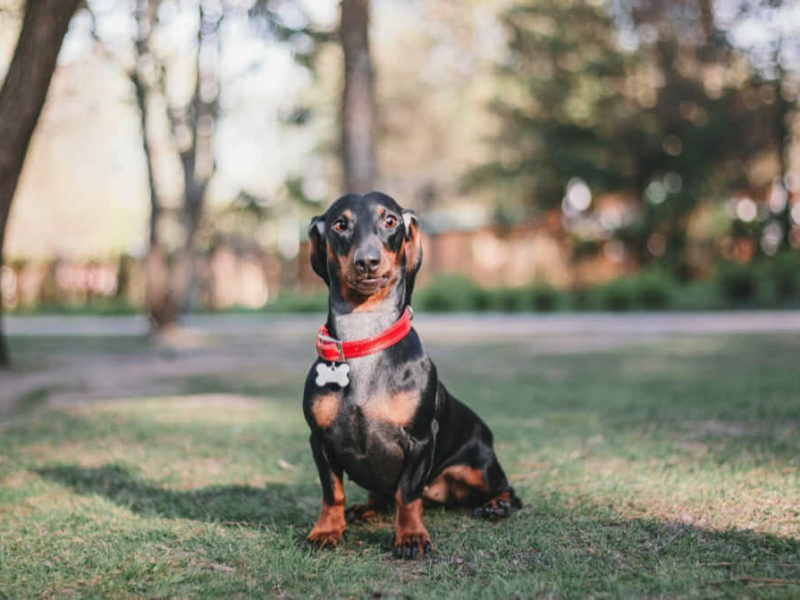
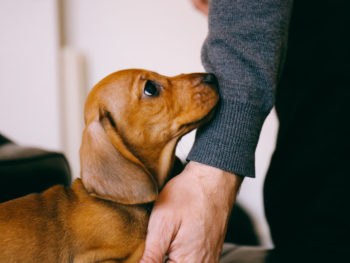





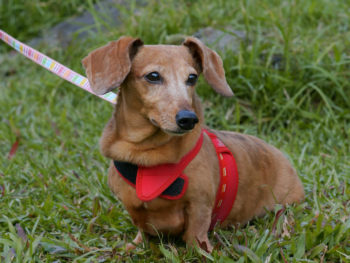

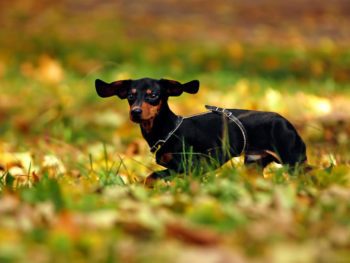
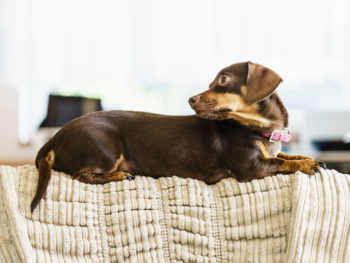
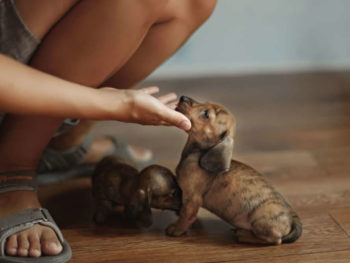

 10 Things I See in Dachshund Groups That Make My Blood Boil
10 Things I See in Dachshund Groups That Make My Blood Boil


